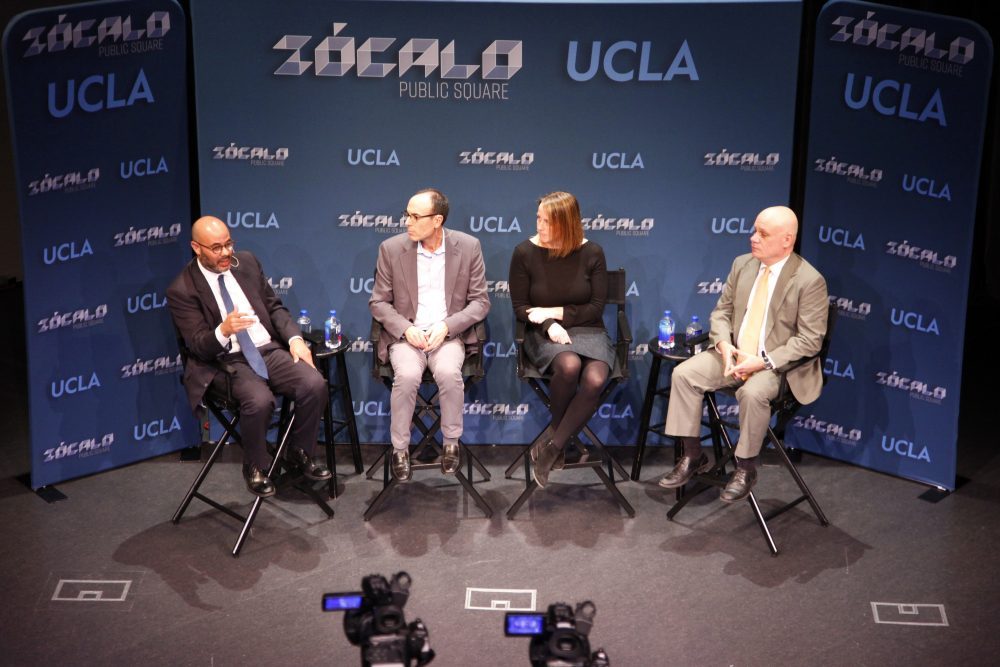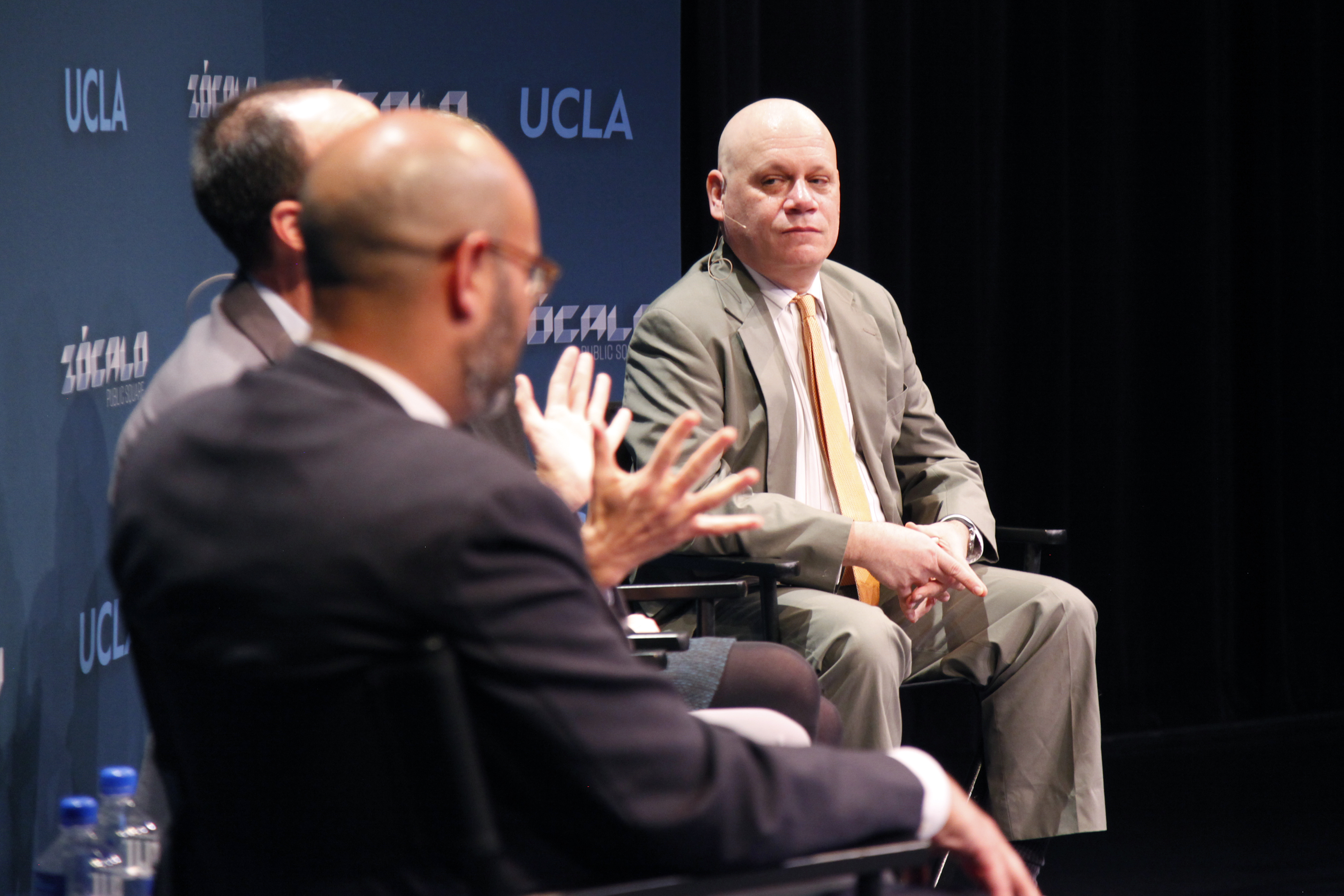
Photo by Aaron Salcido.
The United States Supreme Court could use the power it has over American life to identify new protections for criminal defendants and for people whose privacy has been invaded by new technology, said legal scholars and court watchers at a Zócalo/UCLA Downtown event.
But the same scholars warned that the court’s conservative majority, reinforced by the recent appointment of Justice Brett Kavanaugh, also could grant greater power to corporations and curtail affirmative action, reproductive rights, and protections for immigrants and LGBT people.
The scholars—law professors with expertise in areas from guns to government regulation to education—were addressing the central question of the event, “How Will the New Supreme Court Change America?” at the National Center for the Preservation of Democracy in downtown Los Angeles. But they offered their predictions with caution and caveats, with one panelist, UCLA Law School’s Adam Winkler, noting that law professors have poor records of prognostication.
The moderator, The Wall Street Journal Supreme Court correspondent Jess Bravin, noted in his opening that the court is unique in that “it’s only answerable to itself.” And so despite the justices’ general respect for precedent, the court can break new ground. Bravin pressed the panelists on where they think that ground might lie.
Beth Colgan, a UCLA School of Law professor who teaches and researches criminal procedure and juvenile justice, pointed to the new questions technology is raising about privacy. Recent cases, including one that limited law enforcement’s use of cell phone data, and some words from the relatively new Justice Neil Gorsuch, suggest that the court is skeptical of the power that technology gives the police to gather information on our lives.
She said future cases could look at automatic license plate readers used by police and examine surveillance tactics in Baltimore, where planes fly over the city to record and store everything taking place, so that police can use it later. “I always tell my students that I fear our future robot overlords, but I think the court does too,” she said.
Winkler of UCLA School of Law, a specialist in constitutional law who has written about gun rights and corporate rights, said the newer justices—Gorsuch and Kavanaugh—seem likely to curtail the ability of administrative agencies in the government to regulate corporations. He also asked whether the logic of a recent decision, in Janus v. AFSCME, which prohibited public employee unions from collecting fees from non-union employees they represent, might be applied to challenge union prerogatives in private employment.
“If that’s the case, it’s hard to see how unions can survive even in the private workplace,” he said.
When Bravin pressed for other areas where the court could make big shifts, Winkler cited reproductive rights, which he argued have already been reduced by state laws that have forced the closing of clinics that provided abortions.
“The only question is whether the court will overturn Roe v. Wade,” Winkler said. “And I think undoubtedly that it will,” he added, to gasps from some audience members.
Justin Driver, a University of Chicago Law School professor who clerked for Justice Stephen Breyer and former Justice Sandra Day O’Connor, said he too saw change coming in reproductive rights. He noted that some justices seemed to be avoiding the mention of important abortions rights precedents in their decisions, a sign that they may be preparing to overturn those precedents.
Driver, author of the new book The Schoolhouse Gate: Public Education, the Supreme Court, and the Battle for the American Mind, also predicted that race-conscious college admissions and other forms of affirmative action “may be on their way out.” And he expressed concern that if states pass laws taking away public benefits from undocumented immigrants—including the right to attend public school—the current court might back the states.
Driver pointedly challenged the conventional wisdom that the U.S. Supreme Court tends to reflect the views of American society at large. He said that far more important than public opinion are the views of particular people on the Supreme Court. He suggested that if same-sex couples had not fought for marriage rights while a sympathetic Justice Anthony Kennedy was on the court—and instead waited for the current court—those rights might have not been vindicated by the Supreme Court in a 5-4 decision in 2015.
Indeed, Driver and Winkler both expressed concern that the current court’s inclination to protect the religious rights of businesses to refuse to serve LGBT customers—as in a recent case in which the court sided with a Colorado cake shop that wouldn’t bake a wedding cake for a gay couple—might portend more decisions unfavorable to gay rights. Driver said that, while Republican-appointed justices of previous generations sometimes drifted left while on the court, that seems less likely to happen with the younger GOP-appointed justices, who all had worked in the executive branch under Republican presidents.
Colgan, though, pointed out that, while the U.S. Supreme Court “sets a floor” for the law, state supreme courts and state legislatures have the ability to push forward into new legal frontiers. She expected states might be willing to lead in reform in the criminal justice arena that would go beyond what the U.S. Supreme Court could do. “Oftentimes, we put the Supreme Court on a pedestal, but it’s not the only place where we get to change the law,” she said.
During the question-and-answer session, one audience member said she found the discussion “incredibly depressing” and asked, when it comes to the Supreme Court, “what do we have to look forward to?”
Driver answered that he saw potential for progress if liberals and libertarians find common ground in advancing the law in creative ways. He thought they could succeed, for instance, in eliminating corporal punishment in schools at last. Colgan said she thought the court might rule in ways that would protect Americans against excessive fines and financial penalties—as when police seize the cars of defendants accused of low-level drug dealing.
Bravin, the moderator and veteran Supreme Court reporter, closed by urging people to go to the Supreme Court web site and listen to audio of the oral arguments. He said that while Americans are not terribly impressed by the oratory and thinking they see in Congress, Supreme Court justices do handle difficult questions thoughtfully and seriously.
“I’ve found that almost anyone who actually comes to watch a Supreme Court argument walks away having their expectations exceeded,” said Bravin, adding that people may be impressed even when they “listen to the justices that you expect to disagree with.”





Send A Letter To the Editors